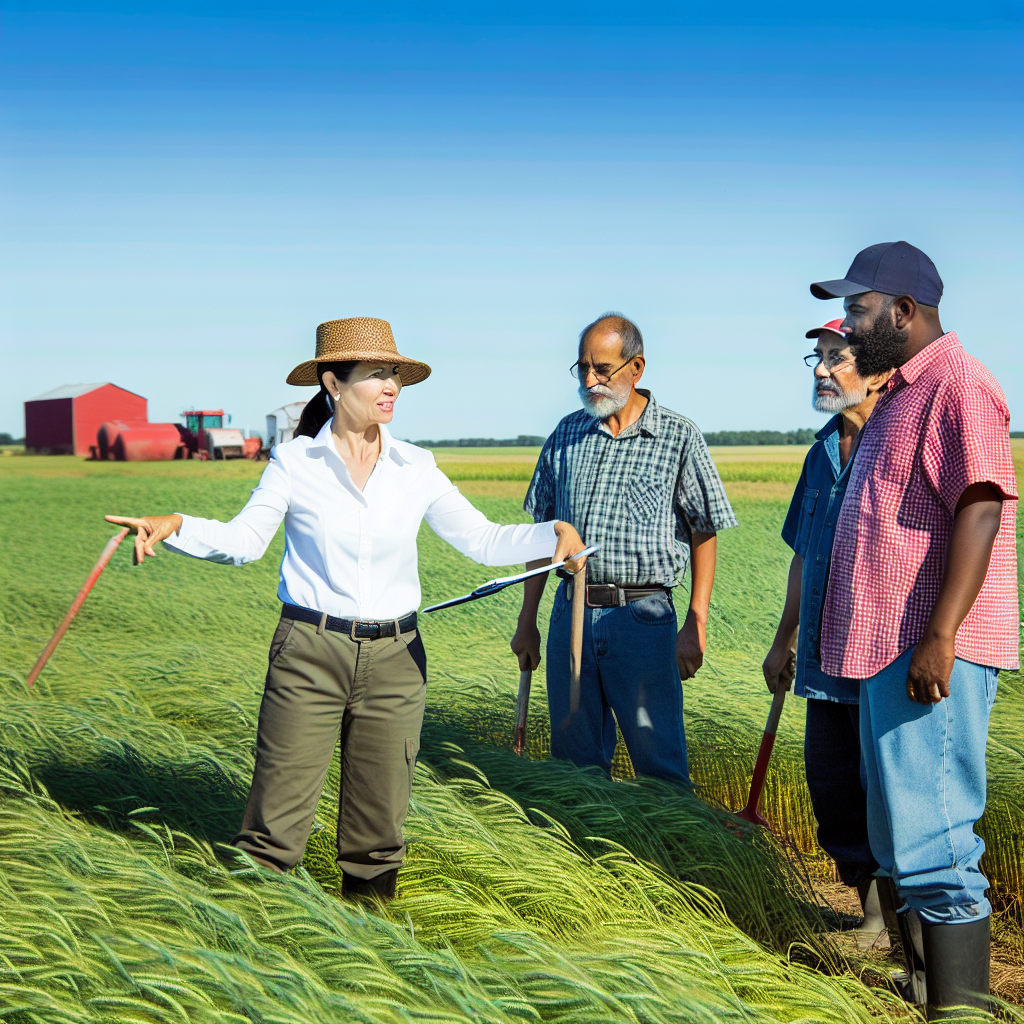Conducting Soil and Crop Assessments
Understanding Nutrient Needs
Crop advisors conduct detailed assessments to determine nutrient needs.
They analyze soil samples for nutrient composition and pH levels.
Furthermore, they evaluate plant tissue samples to confirm health status.
This information guides fertilizer applications and soil amendments.
Assessing Soil Health
Soil assessments also focus on soil health indicators.
Advisors measure organic matter content and microbial activity.
They examine soil structure and drainage characteristics as well.
These factors influence crop yield and sustainability practices.
Implementing Best Practices
Crop advisors recommend best practices based on assessment results.
This includes crop rotation strategies and cover cropping techniques.
Additionally, they provide guidance on sustainable fertilizer use.
Educating farmers on integrated pest management is also essential.
Key Responsibilities of a Crop Advisor in Canada
Understanding Soil Conditions
A crop advisor evaluates soil quality and characteristics.
They analyze pH levels, nutrient content, and moisture retention.
Furthermore, they recommend soil amendments to enhance fertility.
These amendments may include fertilizers, lime, or organic matter.
Consequently, successful crop growth becomes more achievable.
Assessing Climate Factors
Climate plays a crucial role in crop selection.
A crop advisor studies local weather patterns and forecasts.
They consider temperature ranges and precipitation levels.
Additionally, they analyze frost dates to guide planting times.
This information helps in selecting crops suitable for the region.
Recognizing Market Demand
A crop advisor stays informed about current market trends.
They research consumer preferences and potential profit margins.
Moreover, they advise farmers on emerging crops with high demand.
Unlock Your Career Potential
Visualize a clear path to success with our tailored Career Consulting service. Personalized insights in just 1-3 days.
Get StartedThis ensures farmers can make informed financial decisions.
Ultimately, meeting market demands supports farm sustainability.
Advising on Crop Selection
Based on soil and climate evaluations, crop advisors suggest specific crops.
They consider both short-term and long-term agricultural goals.
For instance, they may recommend drought-resistant varieties.
This choice can buffer against climate variability.
In doing so, advisors help maximize yield and profitability.
Supporting Integrated Pest Management
Crop advisors also provide strategies for pest management.
They monitor pest populations and recommend control measures.
These measures may include biological, cultural, and chemical controls.
By advising sustainable practices, they help protect the ecosystem.
Consequently, farmers reduce pesticide usage and promote biodiversity.
Enhancing Sustainability Practices
Advisors promote sustainable farming techniques as well.
They encourage crop rotation and cover cropping.
These practices contribute to soil health and reduce erosion.
In addition, they may recommend precision agriculture technologies.
This approach conserves resources and optimizes inputs.
Developing and Recommending Integrated Pest Management Strategies
Understanding Integrated Pest Management
Integrated Pest Management (IPM) is a holistic approach to crop protection.
It combines biological, cultural, and chemical methods.
The goal is to minimize pest populations sustainably.
Assessing Pest Problems
A crop advisor must evaluate pest populations accurately.
They assess the types of pests present in the fields.
This assessment informs the development of management strategies.
Recommending Cultural Practices
Cultural practices can help prevent pest infestations.
Crop rotation is an effective method to disrupt pest cycles.
Furthermore, maintaining proper soil health supports plant resilience.
By promoting biodiversity, advisors can enhance ecosystem functions.
Implementing Biological Control Methods
Biological control leverages natural predators to manage pests.
For instance, releasing ladybugs can control aphid populations.
Crop advisors evaluate which beneficial organisms to introduce.
Utilizing Chemical Control Options
In some cases, chemical pesticides may be necessary.
Advisors must select safe and effective pesticides for use.
Moreover, they provide guidance on proper application techniques.
Monitoring and Evaluation
Continuous monitoring is critical for IPM success.
Crop advisors track pest populations and crop responses.
Regular evaluations enable timely adjustments to strategies.
Education and Outreach
Crop advisors play a vital role in educating farmers.
They offer training on best practices for pest management.
Workshops and field days enhance community knowledge and skills.
You Might Also Like: Importance Of Livestock Nutrition In Canada
Monitoring Crop Conditions and Growth Progress
Importance of Regular Monitoring
Regular monitoring ensures timely interventions in crop management.
This practice prevents potential losses and optimizes yields.
Farmers benefit from precise advice based on actual conditions.
Assessing Soil Health
A crop advisor first assesses soil conditions at various growth stages.
This assessment includes checking pH levels and nutrient availability.
Healthy soil contributes significantly to crop productivity.
Regular soil tests help maintain optimal conditions for growth.
Observing Weather Patterns
Advisors observe daily weather changes to predict crop outcomes.
Identifying trends helps in planning irrigation and fertilization.
Weather data assists in assessing possible pest and disease outbreaks.
Evaluating Crop Growth Stages
Identifying crop growth stages is crucial for effective management.
Each stage requires specific care and resources.
Advisors guide farmers on when to apply fertilizers or pesticides.
Documenting Findings
Documentation of observations creates a reliable record of crop health.
This record assists in future planning and decision-making.
It also enables tracking improvements over time.
Providing Timely Recommendations
Crop advisors offer tailored recommendations based on monitoring data.
These recommendations support sustainable and profitable farming.
Continuous communication fosters strong relationships with farmers.
Delve into the Subject: Education and Certifications for Seed Technologists
Key Responsibilities of a Crop Advisor in Irrigation Management
Optimizing Water Usage
A crop advisor provides critical recommendations for irrigation management.
These recommendations help optimize water usage in farming operations.
Effective water management ensures crops receive adequate moisture.
This process enhances yield potential and resource efficiency.
Moreover, it reduces waste and promotes sustainability.
Analyzing Soil and Crop Needs
Understanding soil properties is essential for irrigation effectiveness.
A crop advisor evaluates soil moisture levels regularly.
This analysis helps determine the specific water requirements of crops.
Additionally, it assists in identifying areas of water stress.
Consequently, timely irrigation can be implemented to mitigate these issues.
Implementing Irrigation Technologies
Crop advisors recommend suitable irrigation technologies for farms.
For instance, they may suggest drip or sprinkler systems based on needs.
These technologies improve water application efficiency significantly.
Furthermore, automation can be integrated to enhance precision.
This integration ultimately saves labor and water resources.
Monitoring Weather Conditions
Weather monitoring is crucial for effective irrigation management.
A crop advisor analyzes weather patterns to inform decisions.
Understanding rainfall forecasts helps in planning irrigation schedules.
Additionally, this analysis aids in anticipating potential drought conditions.
Farmers benefit from adapting their irrigation practices accordingly.
Educating Farmers
Education is a vital aspect of a crop advisor’s role.
They provide training on efficient irrigation practices.
Workshops can be organized to cover best practices in water management.
Furthermore, advisors may offer guidance on compliance with regulations.
Such education empowers farmers to make informed decisions.
Learn More: Impact of Climate Change on Seed Technology Practices

Offering Guidance on Sustainable Farming Practices
Promoting Environmental Stewardship
Crop advisors play a crucial role in fostering environmental stewardship.
They guide farmers toward adopting sustainable practices.
Consequently, these practices enhance soil health and biodiversity.
Moreover, they help in reducing the carbon footprint of agricultural activities.
Assessing Current Practices
A key responsibility involves assessing current farming practices.
Advisors collect data concerning soil conditions and crop yields.
This data guides recommendations for improvements.
Furthermore, they identify areas that require immediate attention.
Implementing Sustainable Techniques
Advisors recommend various sustainable techniques for farmers to adopt.
These techniques may include crop rotation and cover cropping.
Additionally, they emphasize the importance of integrated pest management.
Such strategies minimize chemical input while maximizing yield.
Monitoring Environmental Impact
Continuous monitoring of farming practices is essential.
Advisors track the environmental impact of farming operations.
This includes overseeing water usage and soil erosion patterns.
They provide feedback to farmers regarding their environmental performance.
Facilitating Training and Workshops
Crop advisors organize training sessions for farmers.
These sessions focus on educating them about sustainable practices.
Workshops enhance the incorporation of new techniques into current farming systems.
As a result, farmers are better equipped to tackle sustainability challenges.
Collaborating with Government and Organizations
Crop advisors collaborate closely with governmental bodies and NGOs.
Their goal is to access resources and funding for sustainable projects.
This collaboration fosters community engagement and knowledge-sharing.
Ultimately, it strengthens the agricultural sector’s sustainability efforts.
You Might Also Like: Livestock Nutritionist Job Opportunities In Canada
Key Responsibilities of a Crop Advisor
Supporting Crop Production Planning
Crop advisors play a vital role in the development of crop production plans.
They collaborate with farmers to understand specific needs and objectives.
Additionally, they analyze various factors affecting crop yield and profitability.
These factors include soil health, climate conditions, and pest management.
Furthermore, advisors help in creating realistic budgets for crop production.
This process involves estimating costs and projecting potential returns.
Ultimately, it aids farmers in making informed financial decisions.
Conducting Research and Analysis
Crop advisors conduct thorough research to stay updated on best practices.
They evaluate the latest technological advancements in agriculture.
Advisors also analyze data from past crop performances.
This data-driven approach helps in optimizing future production strategies.
Additionally, they assess market trends that can impact crop prices.
Such insights allow farmers to adjust their plans accordingly.
Providing Technical Support and Recommendation
Advisors offer technical guidance on various aspects of crop management.
They provide recommendations on seed selection and planting techniques.
Moreover, they advise on the use of fertilizers and pesticides.
This ensures farmers adopt sustainable practices while achieving high yields.
Furthermore, they assist in developing pest control strategies.
By doing so, they help mitigate risks to crop production.
Training and Educating Farmers
Education is crucial in the role of a crop advisor.
They conduct training sessions for farmers on innovative agricultural techniques.
Additionally, they share knowledge about environmental sustainability practices.
Hands-on training enhances the skills and confidence of farmers.
Ultimately, it leads to improved crop productivity and profitability.
Crop advisors also facilitate workshops to encourage community engagement.
Educating Farmers on the Latest Agricultural Technologies and Innovations
Importance of Up-to-Date Knowledge
Farmers must stay informed about current agricultural technologies.
This knowledge enhances productivity and efficiency on their farms.
Moreover, it helps them adapt to changing environmental conditions.
Workshops and Training Sessions
Crop advisors often organize workshops for local farmers.
These sessions cover essential topics like precision farming and drone technology.
Farmers can engage directly with experts during these events.
One-on-One Consultations
Personalized consultations allow crop advisors to tailor advice to individual needs.
Advisors assess specific farm conditions before suggesting technologies.
This approach ensures practical application of new tools and methods.
Online Resources and Webinars
Many crop advisors now utilize online platforms for education.
Webinars provide a flexible option for farmers to learn at their own pace.
Additionally, online resources offer up-to-date information at their fingertips.
Collaboration with Technology Companies
Advisors often collaborate with tech companies for specialized training.
These partnerships give farmers access to cutting-edge innovations.
It also promotes the use of advanced tools in everyday farming practices.
Staying Ahead of Regulatory Changes
Crop advisors educate farmers about new agricultural regulations.
Staying compliant is crucial for successful farming operations.
Advisors help farmers understand the implications of these changes.
Additional Resources
Posts Tagged: Pistachios – Imperial County




